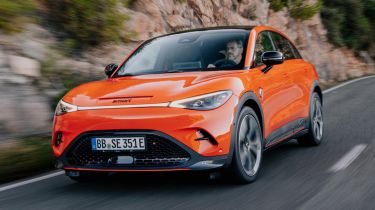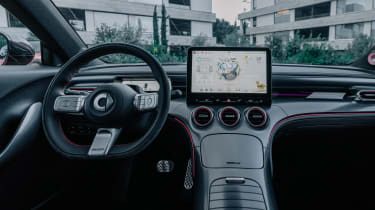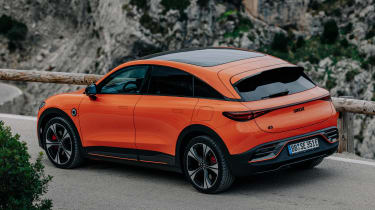New Smart #3 Brabus 2024 review: It's hot, maybe too hot!
The high performance Brabus version of the Smart #3 delivers a level of pace that was once alien to compact SUV drivers but is becoming par for the course.

Verdict
There’s no getting away from the pure potency of the Smart #3 Brabus powertrain and it’s impressive in the way it mixes the liveability of the regular #3 with supercar performance. There are still levels of engagement the Brabus can’t tap into, however, and it’s difficult to really develop a bond with the slightly numb overall driving experience.
Mention ‘Smart Car’ to the general populous and you’ll most likely be met with a retort about the tiny, yet iconic, Smart Fortwo that was originally known by the Smart Car moniker. Times change though and Smart is deep into the process of redefining itself as a mainstream electric car brand. As such, it’s launching its second SUV, the Smart #3 and like the first (the Smart #1) this car available in extremely hot Brabus form.
Smart and Brabus go way back, thanks to Smart’s parent company Mercedes’ long-running involvement with the German tuner. That original Fortwo was also tweaked by Brabus (one of its more ridiculous creations) and several Smarts have received Brabus modifications since. The #1 and #3 go several steps further than previous Smart Brabuses (Brabi?) thanks to the performance possibilities electric vehicles can so easily tap into. Whether it’s sensible to go quite as far as the #3 Brabus does is another question.
The battery in the Smart #3 Brabus is the same 66kWh unit you’ll find in the Pro+, Premium and 25th Anniversary Edition but the Brabus gains an extra electric motor on the front axle to deliver all-wheel drive and boost power from 268bhp to 422bhp. The torque figure of 543Nm is equally monstrous for a car of this size.
Used - available now

2024 Cupra
Formentor
22,664 milesAutomaticPetrol1.4L
Cash £22,387
2020 Toyota
GR Yaris
14,494 milesManualPetrol1.6L
Cash £30,563
2022 Fiat
500
8,538 milesManualPetrol1.0L
Cash £9,387
2022 Citroen
C4
32,555 milesManualPetrol1.2L
Cash £12,787This isn’t a unique offering to the Brabus, however. The Volvo EX30 uses the same SEA platform as the #3 and in Twin Motor Performance guise it has the same dual-motor powertrain - completing the 0-62mph sprint in 3.6 seconds - edging ahead of the Brabus’ 3.7-second time. The Volvo comfortably beats the Brabus in terms of range, however, with the Swedish car managing 286 miles to the Brabus’ 258 miles.
This hot Smart #3 feels every bit as quick as that 0-62mph time suggests and it’s a satisfying linear surge of power. The straight-line performance is breathtaking and almost all-encompassing. Once you reach a corner (these can arrive rather quickly in the Brabus) the rest of the car seems like it can’t quite cash the cheque written by the dual-motor's 422bhp output.
The brakes act like a switch, they’re either on or off. They have decent stopping power, but little in terms of feel. The steering is perhaps a little too quick because it’s rather easy to upset the front end - although it is responsive to your inputs. It’d be a tad unfair to label the the Brabus as a ‘point and squirt’ merchant but there’s no doubt that its best work is done between the twisty bits. Entering a corner, you pick a line and can easily stick to it because you can lean on the copious grip levels - even though the tyres are no wider than the standard car’s.
Like the brakes, it’s difficult to modulate the accelerator pedal, so you end up booting the accelerator out of the corner, sometimes resulting in a break of front-end traction, other times the rear - it seems to depend on the road surface. The suspension has been stiffened compared to the less extreme #3 models, although there’s no adjustable damping here to really fine-tune your experience. There’s no getting away from the 1,810kg kerbweight (100kg more than the single-motor car), but there’s equal weight distribution between the axles so it stays impressively flat through the corners.
For the most part, the Brabus feels just as refined as the regular #3. The firm suspension equals a slight trade-off in ride comfort, but longer journeys won’t feel like a burden. Wind and road noise is a little too prominent, we’d perhaps like extra augmented motor sound coming through the speakers (especially in the hot ‘Brabus’ driving mode) to give a more engaging feel and help you keep track of your speed.
The interior is very much like that in the #1 Brabus and many other Mercedes Brabus cars we’ve seen. Red seat belts, red seats with perforated suede and further red accents plus ‘B’ badging throughout gives the #3’s otherwise rather friendly, curvy interior a meaner look. As with the standard #3, the lower seat positioning over the #1 works a treat for the performance-focused Brabus and the seat itself is cosseting yet comfortable. There’s also a standard-fit 10-inch head-up display - featuring some of the less distracting graphics that we’ve come across.
There’s no mistaking this for anything other than a Brabus model on the outside. For starters there’s a wealth of Brabus badging but there’s also a bold two-tone, red and black paint job, tweaked front and rear bumper, more pronounced rear spoiler, an additional vent on the nose and big 20-inch wheels with red brake callipers behind.
Pricing for the Smart #3 has now been announced with a mild increase of around £1,000 over equivalent #1 versions. The #3 Brabus costs £45,450 - which we don’t need to say is a sizable chunk of money. If you’re in the market for a sub-four second family EV there’s quite a lot around with the MG4 XPower and Smart’s sibling, the Volvo EX30 Twin Motor Performance, being the obvious choices. Neither of them offer their performance within a sleeker and more fashionable coupe-SUV shape, though, and maybe that’s the Smart #3’s trump card.
|
Model: |
Smart #3 Brabus |
|
Price: |
£45,450 |
|
Engine/battery: |
2x e-motor, 62kWh (usable) |
|
Power/torque: |
422bhp/543Nm |
|
Transmission: |
Single-speed automatic, four-wheel drive |
|
0-62mph: |
3.7 seconds |
|
Top speed: |
112mph |
|
Range: |
258 miles |
|
Max charging: |
150kW DC (10-80% in <30min) |
|
On sale: |
Spring 2024 |











